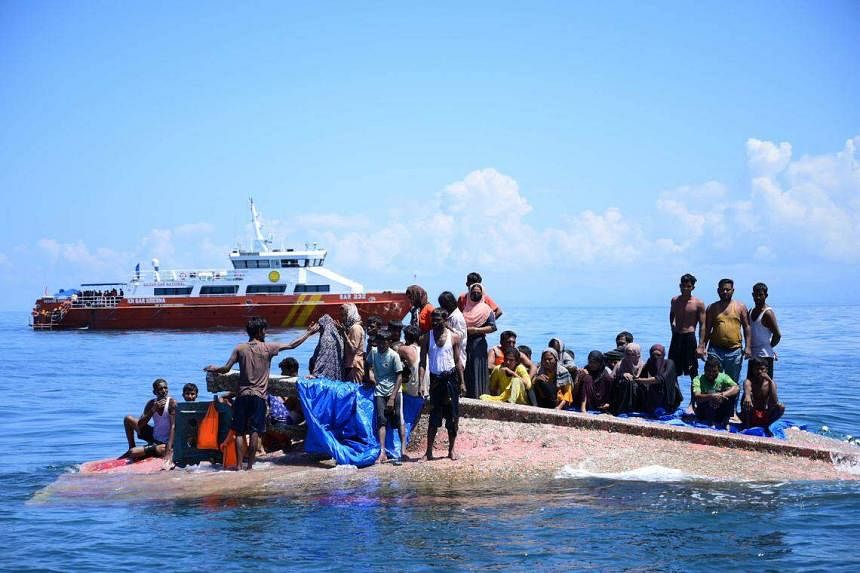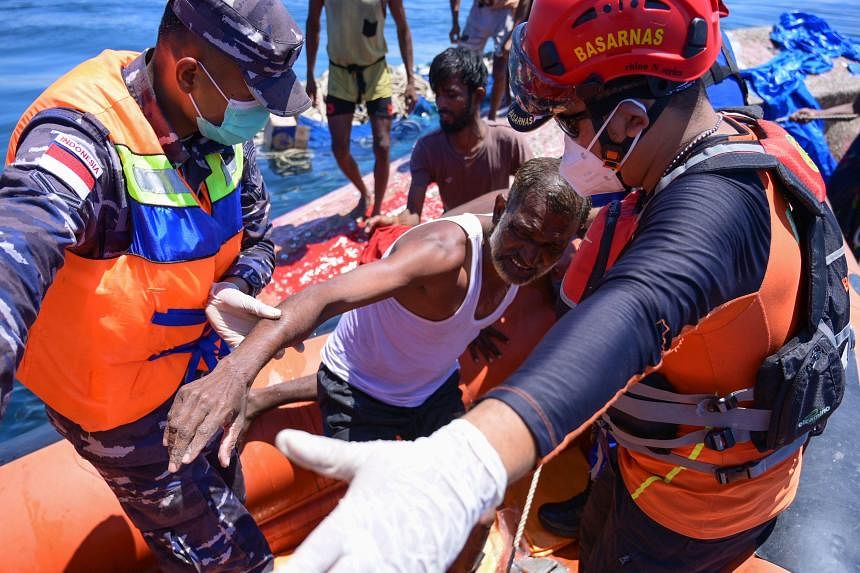MEULABOH, Indonesia - Dozens of Rohingya refugees stranded on the rusty hull of a capsized ship were rescued on March 21 after the dehydrated and sunburnt group had drifted at sea for more than a day.
The group comprised 69 men, women and children, some of whom had been at sea for weeks on a rickety wooden boat from squalid camps in Bangladesh, where many of the heavily persecuted Myanmar minority have fled.
The reddish hull of the vessel poking out of the water was their only refuge after their wooden boat and another vessel trying to help them both capsized on March 20.
The second boat, belonging to local fishermen, overturned when the refugees tried to climb on in a panic.
“Why did the boat capsize? There was heavy rain,” said a 27-year-old survivor who gave his name as Dostgior in broken Indonesian.
Survivors estimated 150 Rohingya had been on board, with dozens swept away, according to local fishermen and the United Nations High Commission for Refugees (UNHCR), in what would represent another tragedy at sea for the heavily persecuted Myanmar minority.
The number of victims rescued alive is 69, the local search and rescue agency said in a statement, comprising nine children, 42 men and 18 women.
Footage from the boat seen by AFP showed men, women and children being taken to safety by the local search and rescue agency.
“I’d been at sea for 15 days, but there are others here who have been here longer than that. Some have been here for a month,” said Mr Dostgior.
He said he had travelled from Cox’s Bazar in Bangladesh, where many Rohingya have fled persecution and were living in squalid camps.
“In Bangladesh, I met someone who could take me to Indonesia. My goal in going to Indonesia is to pay someone to take me to Malaysia. Once in Malaysia, I will pay someone else to enter,” he told AFP.
Many Rohingya make the perilous 4,000km journey from Bangladesh to Malaysia, fuelling a multimillion-dollar human-smuggling operation that often involves stopovers in Indonesia.
The authorities took the group to shore in the West Aceh capital, Meulaboh, on March 21, the local search and rescue agency said.
They were met at Meulaboh port by 10 ambulances and medics, which whisked some of the refugees to hospital while others were taken to a temporary shelter at an old Red Cross building in a nearby village, said an AFP journalist.
But locals in Beureugang village launched a protest against the refugees staying there and unfurled a banner that read: “We reject the Rohingya refugees.”
Some Rohingya boats landing in Aceh in recent months have been pushed back out to sea as sentiment towards the minority group shifts in the ultra-conservative Indonesian province.
Many Acehnese, who themselves have memories of decades of bloody conflict, are sympathetic to the plight of their fellow Muslims.
But others say their patience has been tested, claiming the Rohingya consume scarce resources and occasionally come into conflict with locals.
Some of the refugees said they were from Myanmar and had tried to reach Thailand but were rejected, West Aceh fishing community secretary-general Pawang Amiruddin told AFP on March 20.
On March 20, six Rohingya from the same vessel were rescued by fishermen.

One of those survivors said around 50 refugees had been swept away by currents and were missing or feared dead.
“He said the boat took 151 people. Once the boat capsized, approximately around 50 people may be missing and passed away,” UNHCR protection associate Faisal Rahman said.
“We are still coordinating with respective government agencies to do our best to save as many lives as possible.”
From mid-November to late January, 1,752 refugees, mostly women and children, landed in the Indonesian provinces of Aceh and North Sumatra, according to UNHCR. Hundreds remain in shelters.
The agency said it was the biggest influx into the Muslim-majority country since 2015. AFP

